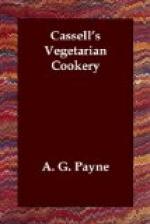We have repeatedly mentioned the addition of wine and liqueurs; but when these are used for flavouring purposes it is not to be regarded in the same light as if taken alone. There is a common sense in these matters which should never be overlooked. The teetotaler who attended the Lord Mayor’s dinner, and refused his glass of punch with his turtle-soup, would be consistent; but to refuse the turtle-soup itself on the ground that a little wine, probably Madeira, might have been added, would proclaim him to be a faddist. It is to be regretted that in the present day so many good causes have been injured by this ostentation of carrying ideas to an extreme. Practically, where wine is used in cookery, it is added solely for the peculiar flavour, and the alcohol itself is evaporated. To be consistent, the vast majority of teetotal drinks, and possibly even stewed fruit itself, would have to be refused on the same ground, viz., an almost infinitely small trace of alcohol. We think it best to explain the reason we have introduced the expression, “if wine be allowed.” In each case it is used for flavouring, and flavouring purposes only. We know that with some persons a very small amount of stimulant creates a desire for more, and when this is the case the small quantity should be avoided; but in the case of the quantity being so infinitely small that it ceases to have this effect, even if not boiled away as it really is, no harm can possibly arise. Where wine is added to soups and sauces and exposed to heat, this would be the case. On the other hand, in the case of tipsy-cake, and wine added to compote of fruit, this would probably not be the case. A great distinction should be drawn between such cases. It will be found, however, that in every case we have mentioned the addition is altogether optional, or a substitute like lemon-juice can be used in its place.
VEGETARIAN COOKERY
CHAPTER 1.
SOUPS.
GENERAL INSTRUCTIONS.
There are very few persons, unless they have made vegetarian cookery a study, who are aware what a great variety of soups can be made without the use of meat or fish. As a rule, ordinary cookery-books have the one exception of what is called soup maigre. In England it seems to be the impression that the goodness of the soup depends upon the amount of nourishment that can be compressed into a small space. It is, however, a great mistake to think that because we take a large amount of nourishment we are necessarily nourished. There is a limit, though what that limit is no one can say, beyond which soup becomes absolutely injurious. A quarter of a pound of Liebig’s Extract of Meat dissolved in half a pint of water is obviously an over-dose of what is considered nourishment. In France, as a rule, soup is prepared on an altogether different idea. It is a light, thin broth, taken at the commencement of the meal to strengthen the stomach, in order to render it capable of receiving more substantial food to follow. Vegetarian soups are, of course, to be considered from this latter point of view.




